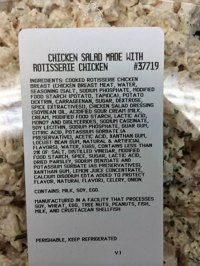Chicken salad made and sold at Costco Wholesale stores in seven states has sickened at least 19 people with E. coli O157:H7 infections. Those sickened live in Washington state, Montana, California, Utah, Colorado, Missouri, and Virginia.
 The CDC, FDA, and USDA are investigating this outbreak, along with public health officials in the affected states. Five of the 19 patients have been hospitalized, and two have developed hemolytic uremic syndrome (HUS). Fourteen of sixteen people interviewed purchased or ate rotisserie chicken salad from Costco the week before they got sick.
The CDC, FDA, and USDA are investigating this outbreak, along with public health officials in the affected states. Five of the 19 patients have been hospitalized, and two have developed hemolytic uremic syndrome (HUS). Fourteen of sixteen people interviewed purchased or ate rotisserie chicken salad from Costco the week before they got sick.
With such a wide distribution of case patients, it’s probable that an ingredient used to make that salad in the stores and purchased in bulk by Costco is the source of the pathogenic bacteria. It is not probable that an ill person or persons has contaminated the product, unless workers made the salad at a central location and it was then shipped across the country.
More illnesses may be announced, and more states may be involved in this recall and outbreak in the days and weeks to come. The ingredient or ingredients responsible have not yet been identified. Costco has removed the salad from stores and it is not available for purchase. They also have ended further production of the product.
For now, here’s what you can do to protect yourself and your family. If you purchased rotisserie chicken salad from any Costco store in the United States on or before November 20, 2015, do not eat it. Discard it in a sealed or double bagged container so other people and animals can’t eat it. You can return the receipt to the store where you bought it for a full refund. Make sure that you wash your hands well after handling this product, and clean the fridge or freezer where it was stored to kill any remaining bacteria.
The product is labeled “Chicken Salad made with Rotisserie Chicken” and has item number 37719 on the label. This product has a shelf life of 3 days. Some people may have taken it home and frozen it. Check your freezer to see if you have any.
Even if some of the salad has been eaten and no one has gotten sick, do not eat any more and throw the rest of the product away. E. coli infections are a serious illness and can cause serious health consequences and even death.
Most people start showing the symptoms of E. coli infections within three to four days. Those symptoms include severe abdominal cramps, bloody and watery diarrhea, a mild fever, nausea, and vomiting. If you or anyone in your family has been experiencing these symptoms, see a doctor immediately.
If E. coli infections are treated with antibiotics, the illness can develop into hemolytic uremic syndrome (HUS), which can be life-threatening. Other risk factors for developing this complication include age; children aged 5 and under are especially susceptible; and underlying health conditions. At least one of the patients in this outbreak is five years old.
The symptoms of HUS include pale skin, lethargy, bleeding from the nose and mouth, little or no urine output, easy bruising, and a skin rash. Anyone experiencing those symptoms must see a doctor immediately because this complication can cause kidney failure.




